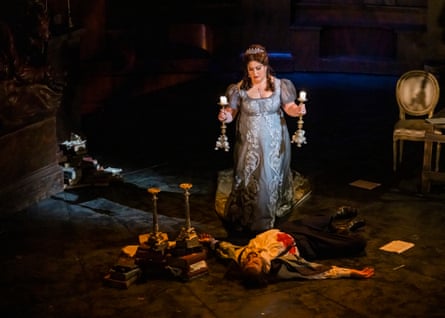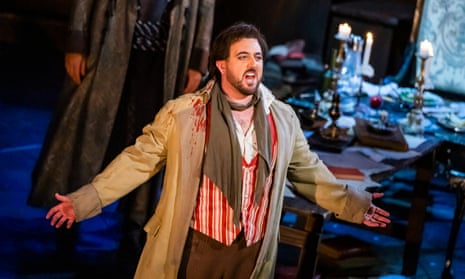An umpteenth revival of a popular work in a classic production – enjoyment guaranteed, revelation not expected. Puccini’s Tosca is back at the Royal Opera House, 10th time round for Jonathan Kent’s staging in Paul Brown’s sumptuous designs (revival director Amy Lane), complete with cast changes too numerous to track. The only comfort for those trying to stage a show in current precarious circumstances is that many involved know how it goes. The bass Jeremy White has sung the character role of Sacristan, with deft geniality, since the production was new in 2006. No doubt by now he could dep for all the parts if required.
Familiarity is part of the pleasure. A devotee will know exactly when the hero Cavaradossi, more republican than artist, it would seem, will finally do something with that idle paintbrush; when the Royal Opera chorus (here in excellent voice), children too, will fill the double staircase to sing the grand Te Deum; and when Tosca will stab the evil Scarpia, while trying not to trip up on her awkwardly long gown. A telling moment in this staging is when the heavy red and gold front drapes fall slowly, softly, ominously, timed precisely with the velvety, menacing chords at the close of Act 2.
There was always a chance that this run might, against odds, be remarkable. And indeed it is. The Ukrainian Oksana Lyniv, first woman to conduct at the Bayreuth festival, making her Royal Opera debut, registered her fiery presence with the opera’s massive opening roar, the orchestra responding with energy surging, solos eloquently taken, the whole shaped with pace and authority. As Tosca, the experienced Italian soprano Anna Pirozzi grew into the part with each act, voice warming as she made the tricky transition from flighty diva to a woman capable of murder. Claudio Sgura had presence and a strong voice as the chief of police, Baron Scarpia, though the baddie-style acting could be reined in.

The real excitement, however, was for Cavaradossi, Freddie De Tommaso, making his role debut, the first British tenor to sing the part at Covent Garden since 1963, and at 28 the youngest. He had upstaged himself already, days earlier, attracting rave headlines by jumping in halfway through for Brian Hymel, taken unwell during the other cast’s opening night. Half Italian but raised in Tunbridge Wells, De Tommaso – remember the name – is hurtling to stardom.
Having trained at the Royal Academy of Music, first as a baritone, then switching up to tenor, he won the international Plácido Domingo Tenor prize in 2018 and was quickly signed up to Decca. Bright-toned in the Italianate style, but with heft to soar over the orchestra in mid-range, De Tommaso is not shy to show how loudly, how securely, how effortlessly he can sing. That prolonged, dazzling high A sharp on “Vittoria!” was, to tell it straight, milked. Why not… it was a rare thrill to hear a tenor voice of this ease and brilliance. The new Pavarotti? We’ve heard that before. This time it might just be true.
Handel’s Messiah, first performed soon after Easter in 1742 but now an Advent tradition, digs deep into the rhythm of the musical season. The work’s grip, for performers and listeners, is tenacious. Think of the 3,600 people who took part, with arduous recording at home, in the Self-Isolation Choir’s online Messiah in May 2020, repeating the exercise this year. This past week, the Hanover Band, small forces, directed from the harpsichord by Andrew Arthur, bravely scheduled five live performances in 10 days.
The second, in the gratifying acoustic of Kings Place, passed, as the text has it, in the twinkling of an eye: not because tempi were fast – though they were – but because the 16 singers, 18 period instrument players and four accomplished soloists (Tara Bungard, Timothy Morgan, Bradley Smith, Edward Price) communicated with such urgency and virtuosity. As an end to 2021’s often bewildering listening year, the concluding fugal “Amen”, with celestial trumpet and thunderous drums, was an appropriate revelation.
Star ratings (out of five)
Tosca ★★★★
Handel’s Messiah ★★★★
Tosca is in rep at the Royal Opera House, London, until 22 February

Comments (…)
Sign in or create your Guardian account to join the discussion